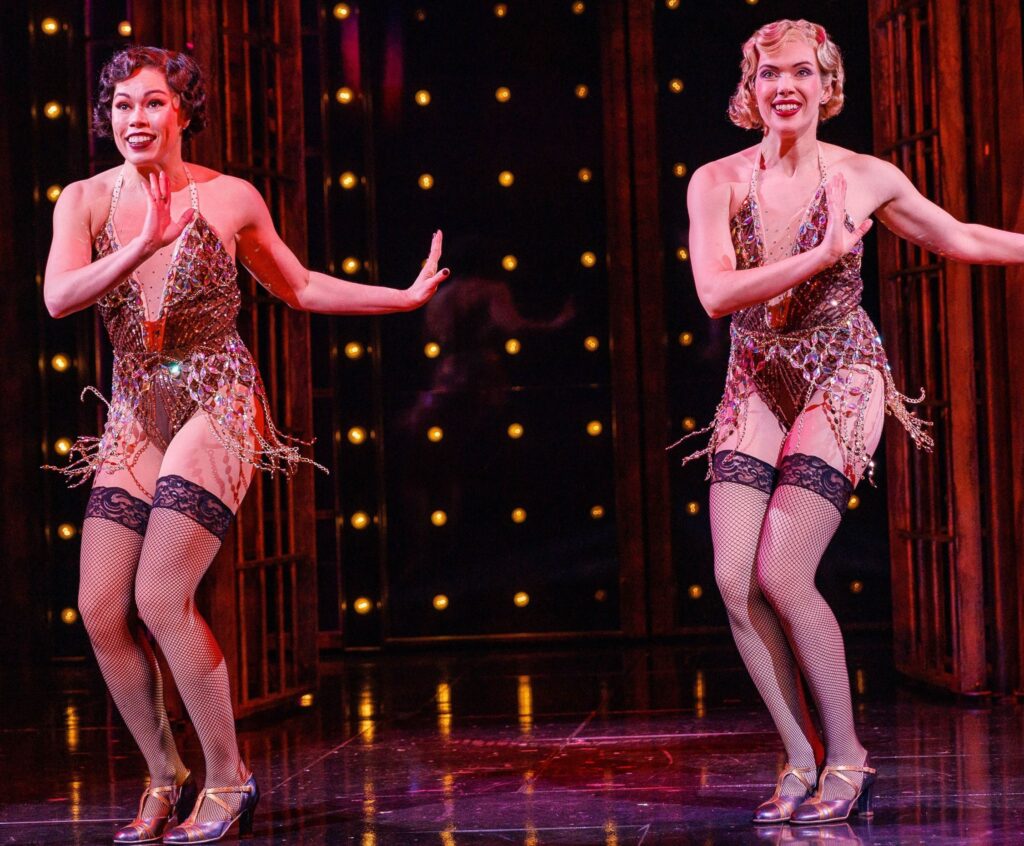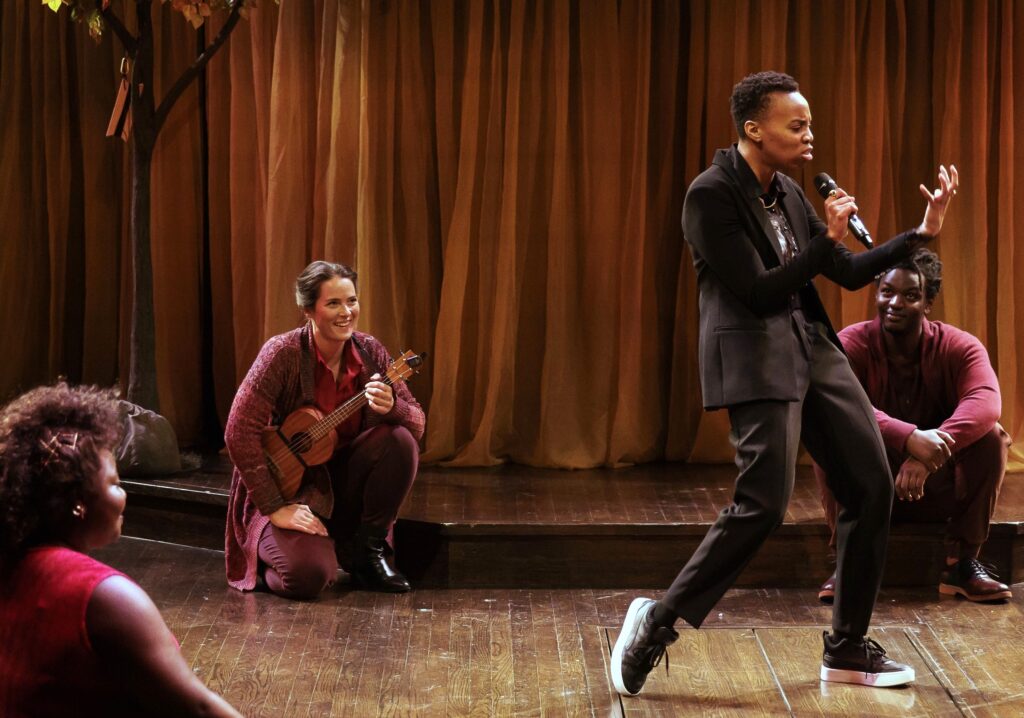As written for MediaNews Group in Michigan:
However you define Power Couple, you will not find a more representative theatrical pair than actor Colm Feore and director-choreographer Donna Feore, who ignite the stages of Ontario’s Stratford Festival. In 2009, for example, Colm played both Macbeth and Cyrano, the latter directed by Donna, whose later “A Chorus Line” and “The Music Man” were both dazzling.
Now, in Stratford’s post-pandemic season, its 70th overall, Mr. and Ms. F. are at it again: his “Richard III,” which inaugurates the Festival’s magnificent new Tom Paterson Theatre, is a superb take on Shakespeare’s villainous monarch, and her “Chicago” is a choreographic gem.
In a sense, Shakespeare’s historical characters are reincarnated with every new production; Artistic Director Antoni Cimolino’s opening to “Richard III” takes that literally. Referencing the 2013 discovery of Richard III’s bones in an excavated Leicester, England car park, Colm Feore’s Richard emerges in full regalia from a simulated work site. It is a stunning prelude to his “…winter of our discontent” speech.
Shakespeare’s “Richard III” follows in time the three parts of “Henry VI.” Having slain that Henry in Part 3, Richard, in his own play, murders his way up the line of succession, disposing of his bride Lady Anne (Jessica B. Hill, excellent), his own brother, assorted Royal acolytes and, most notoriously, his two pre-teen nephews.
Richard’s bones revealed severe scoliosis, a curvature of the spine that contorted the lower half of his “rudely stamped” body into a virtual corkscrew, which Feore affects and then flaunts with astonishing alacrity. Unlike Macbeth, Richard is not impulsively driven or conflicted; his is a deliberate, no-lives-spared quest. Conscienceless (until haunted by spectral dreams), he even shares friendly confidences with the audience, turning us into virtual co-conspirators, at least until he has the nephews slain and the heinousness of his corruption becomes inescapable. (In a chilling gender-switch, James Tyrell, who contracts with Richard to kill the children, is here Jane Tyrell (Hilary McCormack), adding an extra shudder to the scene.)
With super-actor range, Colm Feore makes Richard’s play his own. From the excavation site through to “My kingdom for a horse,” coldly plotting murders, warmly enchanting the audience, even hotly seducing widowed Anne beside her father-in-law’s coffin, Feore’s bravura performance is as multi-layered as any Shakespeare scholar could wish and as accessible as any newbie to the Bard could need.
—————————–
Donna Feore’s re-imagined “Chicago” is a sumptuous song-and-dance buffet. The 1975 Broadway “Musical Vaudeville” by John Kander (music) and Fred Ebb (lyrics and, with Bob Fosse, the book) ran over two years. A revival opened in 1996 and is still running! To say the show has legs is a figurative understatement and, in Ms. Feore’s bright, sassy edition, an apt description.
Scintillating sinners Roxie Hart (Chelsea Preston) and Velma Kelly (Jennifer Rider-Shaw) become a hit vaudeville act after flamboyant lawyer Billy Flynn (Dan Chameroy) gets them both acquitted of capital crimes. (It’s 1920s Chicago, folks.)
The Festival Theatre’s thrust stage has never been graced with more alluring leading ladies or a more raffish leading man or, it must be noted, a harder working ensemble than the twenty top-talents who put the “Razzle Dazzle” into that number and others. Backed by music director Franklin Brasz’s dynamite fourteen-piece orchestra, “All That Jazz,” “Cell Block Tango” and “When You’re Good to Mama” are among the abundance of musical riches.
Ably supported by Michael Gianfrancesco’s glossy settings and Michael Watson’s iridescent lighting effects, it is Donna Feore’s show. You might have seen soft shoe, fan kicks, splits, and jazz hands before, but not likely in the combinations that Feore creates. It is as if the long-established numbers are staged for the first time: “Cell Block Tango” includes enacted tableaux for the six death row inmates, and the ventriloquist’s “When Velma Takes the Stand” is pure genius in design and execution. Razzle dazzle indeed!
——————————
No Shakespearean character is more adaptable to the actor than the “enormously enigmatic” Hamlet. Obviously, each Hamlet is different while the words are the same, but adaptability can apply to a variety of characteristics. Age, for example: The Royal Shakespeare Company’s youngest Hamlet was 24 (David Warner in 1965), and Ian McKellen played the role last year at age 82. That was unusual, but gender-switching has become commonplace since even before Sarah Bernhardt in 1900, while racially-blind casting is more recent. Ruth Negga and Cush Jumbo are examples of both, as is Amaka Umeh, Stratford’s first Black and first female Hamlet.
Ms. Umeh, one year out of the Festival’s Birmingham Conservatory, is age-appropriate (Hamlet is about 27) and is certainly possessed of the required energy level. Directed by Peter Pasyk, Umeh’s Hamlet is less introspective than the usual ‘melancholy Dane,’ less grieving of his father King Hamlet’s recent death than angry over his mother’s hasty re-marriage to the king’s brother Claudius – even before learning of Claudius’s responsibility for the death.
The chilly approach de-emphasizes the more poetic passages but serves the production’s modern-day setting and unsubtle approach. Hamlet and Ophelia’s romantic attachment, for example, is a no-doubter. Their first appearance is in a passionate lip-lock, which does support her eventual descent into despair and madness.
Some other adjustments stretch the updating. iPhones are ubiquitous: Rosenkrantz and Guildenstern take a selfie when they enter the castle; Hamlet’s “tenders of affection” for Ophelia are text messages; and the “words, words, words” Hamlet tells Polonius he is reading are on his phone. Both Hamlet and Laertes packing heat in their back waistbands is nothing new, but guys in suits with squiggly ear pieces wiring Ophelia for sound in the scene where Claudius and Polonius eavesdrop on her meeting with Hamlet might be a wiretap too far.
Anachronistic and stylistic departures noted, the play proceeds at a nippy pace (even at three hours). Ms. Umeh affects masculinity without embroidery, and judging by my audience’s reaction, Stratford’s unique “Hamlet” is a crowd pleaser. And after all, isn’t that a consummation devoutly to be wished?
These three plays continue in repertory through October, joined by Shakespeare’s “All’s Well that Ends Well,” Moliere’s “The Miser,” an adaptation of Louisa May Alcott’s “Little Women,” and other attractions. For schedule and ticket pricing information: 800.567.1600 or online at www.stratfordfestival.ca





